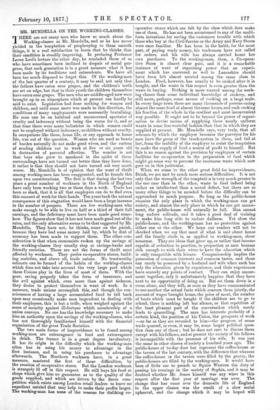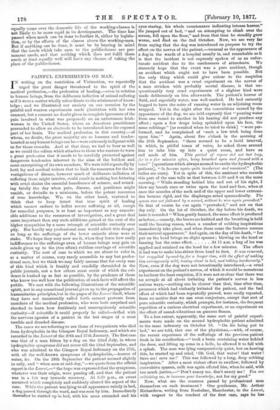MB. MUNDELLA ON THE WORKING-CLASSES.
IHERE are not many men who know so much about the Working-classes as Mr. Mundella, and as he has never yielded to the temptation of prophesying to them smooth things, it is a real satisfaction to learn that he thinks that their condition is steadily improving. In prefacing Professor Leone Levi's lecture the other day, he reminded those of us who have sometimes been inclined to despair of social pro- gress, that each generation is in a great measure what it has been made by its traditions and antecedents. We have all been too much disposed to forget this. Of the working-men of the last quarter of a century, it may be said not only that the fathers have eaten sour grapes, and the children's teeth are set on edge, but that in their youth the children themselves have eaten sour grapes. The men who are middle-aged now were brought up in an atmosphere which at present can hardly be said to exist. Legislation had done nothing for women and children, and until some move was made in this direction, the conditions of many employments were necessarily brutalising. No man can be an habitual and unconcerned spectator of cruelty and indecency without being the worse for it, and at that time there were many industries in which women could not be employed without indecency, or children without cruelty. In occupations like these, home life, or any approach to home life, was out of the question. Women who are used as beasts of burden naturally do not make good wives, and the custom of sending children out to work at five or six years old is destructive of parental affection. The wonder is not that boys who grew to manhood in the midst of these surroundings have not turned out better than they have done, it rather is that they should not have turned out very much worse. Mr. Mundella is of opinion that the want of thrift among working-men has been exaggerated, and he founds this upon two considerations. The first is that during the last two years a great number of workmen in the North of England have only been working two or three days a week. Trade has been so slack, that it is all that employers can do to find even this amount of work for their hands. Ten years back the natural consequence of this stagnation would have been a large increase in the number of paupers. There are few working-men who make enough to be able to live on half or a third of their full earnings, and the deficiency must have been made good some- how. The figures show that it has not been made good out of the rates, and the only alternative seems to be that suggested by Mr. Mundella. They have not, he thinks, come on the parish, because they have had some money laid by, which by dint of economy has been made to support them. The other con- sideration is that when economists reckon up the savings of the working-classes they usually stop at savings-banks and friendly societies. These are not the forms of thrift most affected by workmen. They prefer co-operative stores, build- ing societies, and above all, trade unions. No trustworthy estimate can be formed of the habits of the working-classes which does not take into account the very large part which these Unions play in the lives of most of them. With the poor, saving properly takes the form of insurance, and the evil against which, even more than against sickness, they desire to protect themselves is want of work. In a measure, trade unions accomplish this, and though the con- sciousness of having a large accumulated fund to fall back upon may occasionally make men imprudent in dealing with their employers, this is but a trifle, when weighed against the sense of security against ill-fortune which membership of a union conveys. No one has the knowledge necessary to make him an authority upon the savings of the working-classes, who has not thoroughly familiarised himself with the financial organisation of the great Trade Societies.
The two main forms of improvidence to be found among working-men are extravagance in food and extravagance in drink. The former is in a great degree involuntary. It has its origin in the difficulty which the working-man often has in using his money to advantage in the first instance, and in using his purchases to advantage afterwards. The Northern workmen have, in a great measure, mastered the first of these difficulties, by the creation of co-operative stores. But the London workman is strangely ill off in this respect. He still buys his food at shops which give him no guarantee as to the qnality of the goods supplied, and which are driven by the fierce com- petition which exists among London retail dealers to leave no expedient untried that may help to make their profits larger. The working-man has none of the reasons for disliking co-
operative stores which are felt by the class which does make use of them. He has not been accustomed to any of the multi- form inventions for saving the customers trouble with which those who buy at the Civil Service or the Army and Navy Stores were once familiar. He has been in the habit, for the most part, of paying ready money, his tradesmen have not called for orders, and his wife has always carried home her own purchases. To the working-man, then, a Co-opera- tive Store is almost clear gain, and it is a remarkable instance of want of organising power that an experi- ment which has answered so well in Lancashire should have been left almost untried among the same class in London. Food, however, has usually to be cooked after it is bought, and the waste in this respect is even greater than the waste in buying. Nothing is more wanted among the work- ing classes than some individual knowledge of cookery, and still more, perhaps, some means of cooking on a large scale. In every large town there are many thousands of persons eating almost the same food at almost the same hours, and each cooking his fraction of the whole in the costliest and most inconvenient way possible. It ought not to be beyond the power of organi- sation to devise means of supplying these nearly uniform wants in some less wasteful fashion than that in which they are supplied at present. Mr. Mundella says, very truly, that all schemes by which the employer becomes the purveyor for his men have the germ of the truck-system in them and fail at last, from the inability of the employer to resist the temptation to make the supply of food a source of profit to himself. But this is no reason against the provision by employers of certain facilities for co-operation in the preparation of food which might go some way to prevent the enormous waste which now goes on in this particular.
When we come to the other great field for improvidence, Drink, we are met by much more serious difficulties. It is not only that the strength of the temptation is very much greater in the one case than in the other, waste in food indeed being rather an intellectual than a moral defect, but there are so many other things to be mended before the difficulty can be approached to much purpose. So long as the public-house remains the only place in which the working-man can get society, and almost the only place in which he can get amuse- ment, the public-house will naturally be full. Man cannot long endure solitude, and it takes a good deal of training to make him long able to endure dullness. Yet close the public-house, and the working-man has no protection against either one or the other. We hope our readers will not be shocked when we say that most of what is said about home and the family circle is, as applied to working-men, sheer nonsense. They are ideas that grow up, or rather that become capable of reduction to practice, in proportion as men become rich enough to wish their wives to have the education which is only compatible with leisure. Companionship implies the possession of common interests and common tastes, and these can rarely be possessed by a husband and wife when each has only the education given by experience, and their experiences have scarcely any points of contact. They can enjoy amuse- ment together, only it unfortunately happens that they have next to no opportunity of doing so. But set them down in a room alone, and they will, as soon as they have communicated to one another the actual facts which concern them jointly, the amount of wages brought home, the price of meat, the number of boots which must be bought if the children are to go to school, there is nothing left but silence, or that repetition of the least pleasant part of the conversation which surely leads to quarrelling. The man has interests probably of a certain kind, the position of his Union, the prospects of work —so far as they are revealed to him—the progress of some trade quarrel, or even, it may be, some larger political ques- tion than any of these ; but he does not care to discuss them except with his fellows, and at present the society of his fellows is incompatible with the presence of his wife. It was just the same in other classes of society a hundred years ago. The public-house of to-day does but represent the coffee-house or the tavern of the last century, with the difference that whereas the coffee-house or the tavern were filled by the gentry, the public-houses are filled by the working-men. It would have been of little use to preach to Squire Western the duty of passing his evenings in the society of Sophia, and it may be doubted whether Mr. Jones himself was any wiser in this respect after the first year of marriage was over. The change that has come over the domestic life of England in the upper classes was the result of a slow social upheaval, and the change which it may be hoped will equally come over the domestic life of- the working-classes is not likely to be more rapid in its development. The time has passed when much can be done to further it, either by legisla- tion, or by the efforts of the classes above the working-men. But if anything can be done, it must be by bearing in mind that the needs which take men to the public-house are per- manent needs, and that nothing which does not folfil these needs at least equally well will have any chance of taking the place of the public-house.



































 Previous page
Previous page